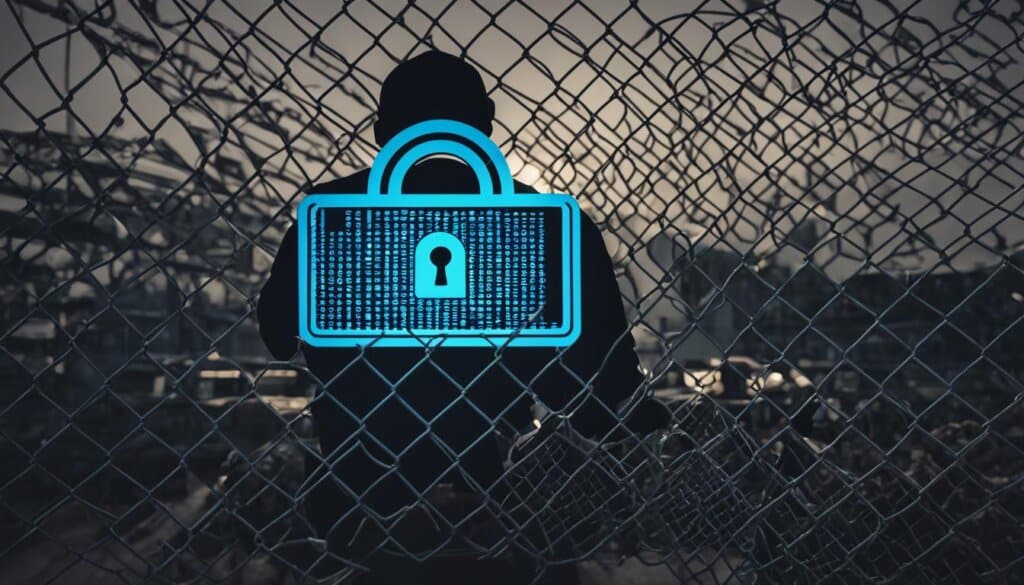Table of Contents
A certificate authority (CA) plays a critical role in ensuring secure connections on the internet. It is a trusted entity that issues SSL certificates, which are used to establish secure communication between web servers and browsers. CAs are an integral part of the public key infrastructure (PKI) and serve as a trust anchor, verifying the authenticity and trustworthiness of websites, domains, and organizations.
SSL certificates provided by CAs enable encryption of sensitive data, protecting user information from unauthorized access. Without them, data transmitted over the internet would be vulnerable to interception and manipulation.
In the next sections, we will delve into the role of a certificate authority, how digital certificates work, the importance of SSL/TLS certificates for secure connections, the various types of digital certificates, the CA/Browser Forum that governs industry guidelines, and factors to consider when choosing a certificate authority. Let’s explore these topics in more detail.
The Role of a Certificate Authority
A Certificate Authority (CA) plays a pivotal role in the Public Key Infrastructure (PKI) ecosystem. Its responsibilities encompass the issuance of digital certificates, which serve to authenticate the identities of entities and ensure secure communication. In addition to this, CAs are entrusted with verifying domain names and organizations to establish trust between communicating entities. Furthermore, they also maintain certificate revocation lists to prevent the acceptance of revoked certificates. As part of their role, CAs charge a fee to complete the verification process and issue digital certificates.
| CA Roles | Description |
|---|---|
| Digital Certificate Issuance | CAs issue digital certificates that authenticate the identities of entities and enable secure communication. |
| Trust Establishment | CAs verify domain names and organizations to establish trust between communicating entities. |
| Domain Verification | Through domain verification, CAs ensure the authenticity of domain names. |
| Certificate Revocation | CAs maintain certificate revocation lists to prevent the acceptance of revoked certificates. |
By proficiently fulfilling these roles, CAs contribute to the establishment of secure connections and the overall integrity of the PKI.
“Certificate authorities serve as the bedrock of trust in the digital world, ensuring the security and authenticity of online transactions.”
How Digital Certificates Work
A digital certificate serves as a credential to validate the identity of the entity it is issued to. It contains information about the entity, such as name, contact information, organization, and public key. The digital certificate also includes the name of the issuing CA and its digital signature, which prove the trustworthiness of the certificate.
The certificate plays a crucial role in ensuring secure communication and maintaining document integrity. Here’s how it works:
- Entity Validation: The digital certificate verifies the identity of the entity it represents. This validation process includes verifying the entity’s identity, contact details, and organization with the issuing CA.
- Encryption: Once the entity’s identity is validated, the digital certificate is used to encrypt communication between the entity and other parties. This encryption ensures that sensitive information remains confidential and secure.
- Integrity: The digital certificate also helps maintain the integrity of documents and data exchanged between the entity and others. By digitally signing the certificate, the issuing CA verifies that the information within the certificate has not been tampered with.
- Digital Signature: The digital signature within the certificate confirms the authenticity and trustworthiness of the certificate. It acts as a seal of approval from the issuing CA, indicating that the certificate can be relied upon.
By combining entity validation, encryption, integrity, and digital signatures, digital certificates play a crucial role in establishing secure communication channels and maintaining trust between entities.
https://www.youtube.com/watch?v=BUQ3oQ-ikQY
SSL/TLS Certificates and Secure Connections
SSL/TLS certificates are essential components in establishing secure connections for secure communication over HTTPS. These certificates, coupled with SSL/TLS cryptographic protocols, ensure the encryption and integrity of data exchanged between web browsers and servers.
When a web browser initiates a connection with a website, it receives the SSL/TLS certificate presented by the server. The browser then authenticates this certificate against its trusted root certificate store, verifying the identity and trustworthiness of the website.
By leveraging SSL/TLS certificates, websites can create a secure and encrypted channel that protects sensitive information from unauthorized access or tampering. This robust security layer not only safeguards user data but also establishes trust between the website and its visitors.
One of the crucial trust indicators provided by SSL/TLS certificates is the padlock icon, prominently displayed in the browser’s address bar. The presence of this indicator reassures users that their connection is secure and that their data is encrypted.

| Benefits of SSL/TLS Certificates and Secure Connections |
|---|
| 1. Enhanced data privacy and confidentiality: SSL/TLS certificates encrypt information exchanged between browsers and servers, making it inaccessible to unauthorized individuals. |
| 2. Trust and credibility: SSL/TLS certificates verify the identity and legitimacy of websites, creating trust between website owners and visitors. |
| 3. Protection against data tampering: Secure connections using SSL/TLS certificates ensure the integrity of transmitted data, preventing any unauthorized modification or tampering. |
| 4. Improved SEO ranking: Search engines value secure connections, and websites with SSL/TLS certificates are more likely to rank higher in search results. |
| 5. Compliance with data protection regulations: SSL/TLS certificates help website owners meet the security requirements outlined by data protection regulations and industry standards. |
Types of Digital Certificates
Certificate authorities (CAs) issue various types of digital certificates to cater to different use cases and security needs. Here are some of the most commonly used types of digital certificates:
- SSL/TLS certificates: These certificates are essential for establishing secure connections between web servers and browsers, ensuring encrypted communication and data protection.
Example of an SSL/TLS certificate:
https://www.youtube.com/watch?v=67Kfsmy_frM
“SSL/TLS certificates play a crucial role in securing online data transmission, enabling trust and protecting sensitive information exchanged between users and websites.”
Code signing certificates: These certificates are used by software publishers to digitally sign their code, ensuring its integrity and authenticity.
“Code signing certificates give users confidence that the software they are downloading and installing is legitimate and has not been tampered with.”
Email signing certificates: These certificates are used to digitally sign and encrypt email messages, providing end-to-end security and ensuring the authenticity of the sender.
“Email signing certificates enable users to verify the identity of the sender and ensure that the content of the email remains private and tamper-proof.”
Object signing certificates: These certificates are used to authenticate software objects, such as macros, applets, or plugins, ensuring their integrity and origin.
“Object signing certificates provide assurance that software objects are from trusted sources and have not been manipulated during transmission or installation.”
User/client signing certificates: These certificates are used for individual authentication, allowing users to prove their identity when accessing secure systems or services.
“User/client signing certificates provide a secure and convenient way for individuals to authenticate themselves online, enhancing security and preventing unauthorized access.”
Each type of digital certificate serves a specific purpose in ensuring security, trust, and authenticity in various domains, including web browsing, software development, email communication, and user authentication.
The CA/Browser Forum
The CA/Browser Forum is an essential organization that plays a crucial role in defining guidelines, policies, and standards for the creation, distribution, and use of digital certificates. Comprising leading certificate authorities (CAs), web browser vendors, and certificate consumer organizations, the CA/Browser Forum ensures the implementation of best practices in the industry.
The guidelines established by the CA/Browser Forum cover various aspects of digital certificates, including certificate expiration, revocation, validation processes, and cryptographic algorithms. These guidelines are designed to enhance the security and trustworthiness of digital certificates and protect the integrity of online communication.
“The CA/Browser Forum’s guidelines and policies are critical in ensuring the reliability and security of digital certificates. By setting standards for certificate expiration and revocation, the forum helps mitigate the risks associated with expired or compromised certificates, safeguarding the integrity of online communication.”
The CA/Browser Forum’s focus on certificate expiration aims to prevent the use of outdated and potentially vulnerable certificates. It sets specific time limits for certificate validity, ensuring that organizations regularly update their certificates to maintain robust security measures.
Additionally, the CA/Browser Forum addresses the important issue of certificate revocation. Revoked certificates are invalidated due to various reasons, such as compromised private keys or changes in an organization’s legal status. By maintaining and distributing certificate revocation lists (CRLs) and implementing the Online Certificate Status Protocol (OCSP), the forum ensures that revoked certificates are promptly recognized and rejected by web browsers and applications.
To help the industry stay up-to-date with evolving security needs and technologies, the CA/Browser Forum regularly updates its guidelines and policies. These updates take into account emerging threats, cryptographic advancements, and changes in the digital landscape. CAs play a vital role in adhering to and implementing these updated guidelines to maintain the highest standards of security and trust for digital certificates.
The Importance of CA/Browser Forum Compliance
Compliance with the CA/Browser Forum guidelines is crucial for CAs to maintain their reputation and trustworthiness. Non-compliance can lead to reputational damage, loss of business, and potential legal consequences. Therefore, CAs undergo periodic audits to ensure their adherence to the forum’s policies.
By complying with the CA/Browser Forum’s guidelines, CAs demonstrate their commitment to providing secure and trusted digital certificates. This commitment instills confidence in website visitors and users, assuring them that their data is protected and that they are engaging with legitimate and authenticated entities.
| Benefits of CA/Browser Forum Compliance for CAs | Consequences of Non-Compliance |
|---|---|
| Enhanced reputation and trust | Reputational damage |
| Increased customer confidence | Loss of business |
| Legal compliance | Potential legal consequences |
By aligning with the CA/Browser Forum’s guidelines, CAs contribute to the overall improvement of online security and foster a more reliable and trustworthy digital landscape.
Choosing a Certificate Authority
When it comes to selecting a certificate authority (CA) for your SSL certificate needs, several factors should be taken into consideration. These factors include:
- Trust: Trust is a crucial aspect to consider, as the CA’s technology directly impacts the security of your website and customer data.
- Customer Service: Good customer service can greatly enhance your overall experience with the CA. Look for a CA that offers prompt and responsive customer support.
- Brand Recognition: Opting for a well-known and reputable CA can provide an added layer of trust and assurance to your customers.
- Cost: While cost shouldn’t be the sole determining factor, it’s important to consider your budget and choose a CA that offers competitive pricing.
- Available Tools: Check whether the CA provides additional tools and services that can simplify the SSL certificate management process and enhance your website’s security.
Trusted CAs undergo regular audits, follow industry guidelines, and contribute to industry standards. Many platforms also provide a list of trusted CAs, making the selection process easier for users.
When making a decision, it’s important to find a balance between trust, customer service, brand recognition, cost, and available tools, ensuring that your chosen CA meets your specific needs and requirements.
Purchasing TLS/SSL Certificates
When it comes to securing your website or online platform, purchasing TLS/SSL certificates is an essential step. These certificates establish trust and encrypt communication between web servers and browsers, ensuring the privacy and security of sensitive data.
Trusted certificate authorities play a critical role in issuing these certificates. One such authority is DigiCert. With their extensive experience and large customer base, DigiCert is a leading CA in the industry. They offer a range of certificates catering to different security needs.
What sets DigiCert apart is their commitment to customer support and certificate management. They provide 24/7 support, ensuring that their customers receive assistance whenever they need it. Additionally, DigiCert constantly innovates solutions for effective certificate management, making it convenient for businesses to maintain and renew their certificates.
Trust and reliability are crucial factors to consider when choosing a certificate authority. DigiCert meets industry standards and has a strong reputation for providing trustworthy TLS/SSL certificates. With DigiCert, you can have peace of mind knowing that your website or online platform is secured by a trusted authority.
FAQ
What is a certificate authority (CA)?
A certificate authority is a trusted entity that issues SSL certificates, which are used to establish secure connections between web servers and browsers. CAs play a vital role in the public key infrastructure (PKI), verifying the authenticity and trustworthiness of websites, domains, and organizations to ensure secure communication and protect user data.
What roles does a certificate authority (CA) play?
A CA issues digital certificates that authenticate the identity of entities and encrypt communication. CAs also verify domain names and organizations to establish trust between communicating entities. They maintain certificate revocation lists to ensure revoked certificates are not accepted. CAs charge a fee to complete the verification process and issue digital certificates.
How do digital certificates work?
A digital certificate serves as a credential to validate the identity of the entity it is issued to. It contains information about the entity, such as name, contact information, organization, and public key. The digital certificate also includes the name of the issuing CA and its digital signature, which prove the trustworthiness of the certificate. The certificate is used to encrypt and secure communication, maintain document integrity, and prevent unauthorized modification.
What are SSL/TLS certificates and how do they establish secure connections?
SSL/TLS certificates are used in conjunction with the SSL/TLS cryptographic protocols to establish secure connections for HTTPS communication. When a web browser connects to a website, it receives the SSL/TLS certificate, which is then authenticated against the browser’s trusted root certificate store. This process ensures secure, encrypted communication between the browser and the web server. Trust indicators, such as a padlock icon, are displayed to indicate a secure connection.
What are the different types of digital certificates?
In addition to SSL/TLS certificates, CAs issue code signing certificates for software publishers, email signing certificates for secure email communication, object signing certificates for authenticating software objects, and user/client signing certificates for individual authentication needs. Each type of certificate serves a specific purpose in ensuring security and trust.
What is the CA/Browser Forum?
The CA/Browser Forum is an organization that maintains guidelines for the creation, distribution, and use of digital certificates. It sets standards for certificate expiration, revocation, and other related policies. The forum includes CAs, web browser vendors, and certificate consumer organizations. CAs are required to comply with the forum’s rules, and any infractions can lead to audits and consequences that affect their reputation and trustworthiness.
What factors should be considered when choosing a certificate authority?
When selecting a certificate authority, factors such as trust, customer service, brand recognition, cost, and available tools should be considered. Trusted CAs undergo regular audits, follow industry guidelines, and contribute to industry standards. Some platforms provide a list of trusted CAs for user convenience.
Where can I purchase TLS/SSL certificates?
TLS/SSL certificates can be purchased from trusted certificate authorities. DigiCert is one of the leading CAs, with extensive experience, a large customer base, and a range of certificates for different security needs. They provide 24/7 customer support and innovate solutions for certificate management. Trust and reliability are essential factors when choosing a CA, and DigiCert meets industry standards and has a strong reputation.







